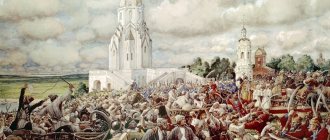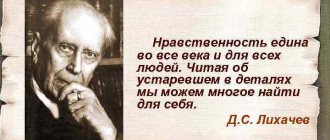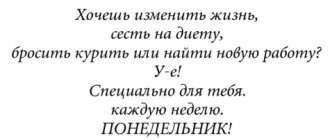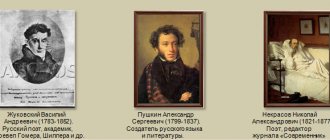Comenius Quotes
Prepared by: Dmitry Sirotkin
I present to you a selection of quotes from the Czech teacher and thinker John Amos Comenius (1592 - 1670).
He is nothing less than the founder of scientific pedagogy and the inventor of the classroom-lesson system.
Quotes are summarized by topic: learning, school, education, parents and children, organization of the educational process, man, upbringing, mind, teachers, morality, youth, psyche, books and reading, order, good advice, life ethics, time, ignorance, wisdom , example.
About training
Everything that needs to be known needs to be taught.
Everything you teach must be presented to students as something that really exists and brings a certain benefit.
Whatever you teach must be taught directly and not in a roundabout way.
Everything that you teach must be taught as it is and happens, i.e. by studying causal relationships.
Let everything that is to be studied be first proposed in a general form, and then in parts.
All parts of a thing must be considered, even the less significant ones, without missing a single one, taking into account the order, position and connection in which they are with other parts.
Everything needs to be studied sequentially, focusing attention on only one thing at a time.
You need to dwell on each subject until it is understood.
The differences between things must be conveyed well so that the understanding of everything is clear.
Behavior should be punished more severely than teaching.
Where your abilities don’t lead you, don’t push you there.
The one who considers it necessary to teach children not to the extent that they can learn, but to the extent that he himself wishes, is completely unreasonable.
Until now, schools have not taught students, like young trees, to blossom from their own roots; rather, they teach them to hang to themselves the branches plucked from the side... Meanwhile, the fundamental teaching of man is a tree with its own roots, which feeds on its own juices, and therefore always lives, grows green, blooms and bears fruit.
Nothing should be forced to be learned except what is well understood. And also nothing can be demanded from the child’s memory except what, judging by the undoubted signs, he has learned.
It is necessary to teach only that which brings the most profound benefit both in the present and in the future life, and even more so in the future. For, according to Jerome’s instructions, it is necessary to study on earth what the study of would have significance for heavenly life.
Educating youth correctly does not mean hammering into their heads a mixture of words, phrases, sayings, opinions collected from authors, but it means revealing the ability to understand things, so that it is from this ability, as if from a living source, that streams of knowledge flow, just as from leaves, flowers, and fruits grow from the buds of trees, and the next year a whole new branch with its own leaves, flowers and fruits grows from each bud.
Since life will have to be spent in communication with people and in activity, it is necessary to teach children not to be afraid of the human face and to endure any honest work, so that they do not become unsociable, or misanthropes, parasites, a useless burden on the earth.
Nothing should be taught on authority alone; but teach everything with the help of evidence based on external feelings and reason.
To support everything with the foundations of reason means to teach everything, pointing out the reasons, i.e. not only to show how something happens, but also to show why it cannot be otherwise. After all, to know something means to know a thing in a causal relationship.
About school
A school without discipline is like a mill without water.
It is important that in every comfortable human community (whether it be the capital, city or village) a school should be established as an educational institution for the joint education of youth.
Since the whole subsequent life depends on childhood and upbringing, the goal will not be achieved if the souls of everyone are not prepared in advance for everything that lies ahead in life.
Therefore, just as there should be cages for fish, gardens for trees, and schools for youth.
So, in the name of the Almighty, let us try to establish a school structure that would exactly correspond to the extremely skillfully constructed and elegantly decorated clocks with various devices.
Not only the rich or noble, but everyone in general should be sent to schools: noble and ignorant, rich and poor, boys and girls in all cities and towns, villages and hamlets.
Happy is the school that teaches you to zealously study and do what is good, even more zealously to do the best, and most zealously to do the best.
By the way, quotes about school
About education
Education must be true, complete, clear and lasting.
A person’s education must begin in the spring of life, i.e. in childhood, for childhood represents spring, youth represents summer, mature age represents autumn, and old age represents winter.
Youth must receive an education that is not apparent, but true, not superficial, but thorough, that is, so that a rational being—man—learns to be guided not by someone else’s mind, but by his own, not only to read from books and understand other people’s opinions about things, or even to memorize and reproduce them in quotations, but develop in oneself the ability to penetrate to the root of things and develop a true understanding and use of them. We must also strive for a thorough assimilation of morality and piety.
This education should occur very easily and gently, as if by itself - without beatings or harshness or any coercion. Just as an organism grows and strengthens if only it is nourished wisely, given warmth and exercise, so, I say, nourishment, warmth, and exercise reasonably provided to the soul should naturally turn into wisdom, virtue, and piety.
By the way, quotes about education
About parents and children
Schools, educators, and preachers can only develop and in some way direct the education of children in the right direction. The basic mentality of an individual is born in the family.
Children should only engage in activities that are appropriate to their age and abilities, as well as activities that they themselves aspire to.
Children are always willing to do something. This is very useful, and therefore not only should it not be interfered with, but measures must be taken to ensure that they always have something to do.
There are children who are sharp-minded and inquisitive, but wild and stubborn. They are usually hated in schools and are almost always considered hopeless; Meanwhile, great people usually come out of them, if only they are educated properly.
All parents should strive to ensure that their children have no shortage of entertainment.
While children are still learning to speak, they should be given freedom to speak and babble as much as possible. But after they have learned to speak, it will be very useful to teach them to be silent also.
By the way, quotes about parents and quotes about children
About the organization of the educational process
The morning hours for classes are the most convenient (since again morning corresponds to spring, noon to summer, evening to autumn, and night to winter).
Everything to be studied must be distributed according to age levels so that only what is perceptible at each age is offered for study.
So, let a system be established in schools in which students study only one subject at a time.
The entire set of educational activities must be carefully divided into classes so that the preceding always opens the way for the subsequent and illuminates its path.
Time must be distributed with the greatest precision so that each year, month, day, hour has its own special work.
No one, under any pretext, should be allowed to skip classes or avoid lessons.
About a human
It is very fortunate, therefore, that someone defined man as a being capable of learning, since no one can become a man unless he is taught.
Although man, like every creature, acquires his own image, nevertheless, without first grafting cuttings of wisdom, morality and piety, he cannot become a rational, wise, moral and pious being.
Anyone who, even as an adult, knows how to speak only in words and not in deeds, has no right to be considered a human being.
Truly we are blind if we do not recognize that the roots of all harmony lie within us.
There is a well-known characteristic of people: before any remarkable discovery is made, they wonder how it could be done, and after that - how was it not discovered earlier?
By the way, quotes about a person
About education
Since we are raising people, not parrots, they must be constantly guided by the clear light of the mind.
There is nothing more difficult than re-educating a poorly educated person.
The essence of what has been said comes down to the following statement by Plutarch: “What kind of children are born, it does not depend on anyone, but to ensure that they become good through proper upbringing is in our power.” Yes, it is in our power, he says. This is how a gardener grows a tree from any living root, using his own art of planting when necessary.
About the mind
There is nothing in our mind that was not previously in our senses.
Aristotle compared the human soul to a blank board on which nothing had yet been written, but on which, however, everything could be written... The difference is that on a board lines can be drawn only to the limits of its edges, while for writing and You won’t find any boundaries in your mind, because the mind is limitless.
The more fertile the field, the more abundantly it produces thorns and thistles. Likewise, an outstanding mind is full of empty dreams if it is not sown with the seeds of wisdom and virtues.
About teachers
He who knows little can teach little.
Since parents very rarely have adequate ability to educate their children and rarely have enough leisure for this, it follows that there should be people who, by their profession, would be engaged in this one thing and so that the needs of the whole community would be served in this way.
If teachers treat students with love, then they will easily win their hearts so that children will enjoy being at school rather than at home.
By the way, quotes about teachers
About morality
By the name of morality we mean not only external decency, but also the entire internal basis of motives.
Care should be taken as much as possible to ensure that the art of truly introducing morality is properly taught in schools, so that schools become, as they are called, “workshops of people.”
There is no more effective way on earth to correct human depravity than the correct education of youth.
About youth
Only that in a person is strong and reliable that was absorbed into his nature in the first period of life.
A person's greatest benefit occurs at an early age. It can even occur only at this age.
In order for a man to become an educated man, God gave him the years of youth, so that, being unfit for other occupations, he would show diligence only for education.
About the psyche
The mind illuminates the path for the will, and the will commands actions.
Likewise, in the movements of the soul, the main moving wheel is the will; the levers that set it in motion are desires and passions that incline the will in one direction or another. The lever that opens the movement and closes it is the mind, which weighs and determines what, where, and to what extent should be desired or avoided.
About books and reading
Books are a tool for imparting wisdom.
Reading and not understanding is the same as not reading at all.
Extracting from the classics will bring excellent benefits, and you will always come across something that will stick firmly in your head and pass into your flesh and blood.
By the way, quotes about books
About order
Order is the soul of things.
If you look closely at the order that prevails in public and private affairs among a well-educated people, everything goes like clockwork... Among the barbarians, everything looks like an untied sheaf or sand without cement.
Good advice
Don't seek praise, but try your best to act laudably.
The golden rule should be constantly refreshed in the memory of young people: nothing superfluous! So that everywhere you can protect yourself from satiety and disgust.
About life ethics
It is easy to follow correctly those who walk ahead correctly.
Nothing feigned can last.
No one becomes a master without practicing mastery.
About the time
Wise allocation of time is the basis for activity.
Consider that day or that hour unhappy in which you did not learn anything new and did not add anything to your education.
By the way, quotes about time
About ignorance
The antidote to ignorance is education, with which the souls of young people should be nourished in schools.
What is a handsome ignoramus but a parrot adorned with feathers?
About wisdom
The study of wisdom elevates and makes us strong and generous.
If parents teach their children to eat, drink, walk, talk, and adorn themselves with clothes, then all the more should they take care to impart wisdom to their children.
By the way, quotes about wisdom
About the example
You can't learn anything without example.
Let it be an eternal law: to teach and learn everything through examples, instructions and application in practice.
About miscellaneous
The tree also needs to be corrected and frequently refreshed with the help of winds, rains, and cold weather, otherwise it easily weakens and withers. In the same way, the human body generally requires strong movements, activities and serious exercise.
Wars must be rejected as something bestial, because humanity is due to people. Set yourself the goal of your life, not war, but peace!
From the above quotes from Comenius, it seems that he promoted both the idea of reasonable order (school as a clock) and the idea of meaningfulness and usefulness of learning.
Looking at our modern school, one gets the impression that the idea of order as a simpler one has been generally implemented , but problems remain with the meaningfulness and usefulness of teaching: a considerable part of the transmitted knowledge is quite abstract and divorced from practical needs.
Quotes about Comenius
- A. Weisman: According to Comenius’ idea, first of all, it was necessary to collect with the greatest care and fidelity everything related to natural history or, as we would now say, to natural science, because in the knowledge of nature Comenius, first of all, saw the basis of our knowledge and the foundation on which true pansophia could be built.
- V. Ermilov: These golden words [Great Didactics] express many great and bright tasks of education - tasks that have not yet been completed to this day. Everyone to everything! These two words mean two saints, but - alas! — truths that have not yet been realized: 1) the benefits of education should be the property of every person; 2) every person must receive a complete, complete education, preparing him for every path of life.
- A. Piskunov: It can be argued that Comenius was at least more than 200 years ahead of his time, and it is no coincidence that the theoretical side of his pedagogical system, as well as his social concept as a whole, attracted special attention from the end of the 19th century, and especially in the middle of the 20th century
Next, you can move on to other collections of quotes:
- Rousseau quotes
- Ushinsky quotes
- Tolstoy quotes
- quotes from Makarenko
- Descartes quotes
- quotes from Sukhomlinsky
I would be grateful if you share the link to the article on social networks with your friends. Use the network buttons below .
Comments are also highly welcome!
Great didactics
The Didactics of 1632 was written in Czech. Immediately after its publication, the author began to supplement and translate the work into Latin (the language of science at that time). The 4-volume “Great Didactics” was published from 1633 to 1638 and today is considered not only one of the greatest works of J. Comenius, but also of pedagogy in general. In it, he outlined his idea of the goals of education and presented a comprehensive view of the theory of learning.
The author described the tasks facing himself in the introduction: “We decide to promise the Great Didactics, i.e. the universal art of teaching everyone everything. And, moreover, teach with sure success; so that failure cannot follow; teach quickly, so that neither the teachers nor the students are burdened or bored, so that learning occurs rather with the greatest pleasure for both parties; teach thoroughly, not superficially and, therefore, not for form, but moving students towards true science, good morals and deep piety.” According to Comenius, this is necessary not only for the prosperity of the individual, but also for the good of the state. There is a context here - as a result of the Thirty Years' War (1618-1648), the Czech Republic lost its independence, and the task of preserving national authenticity was perceived very sharply among the intelligentsia. Hence the desire to put education at the service of this goal.
Another important point in the general characteristics of the “Great Didactics” is that the author, contrary to medieval tradition, sees in education not Satan’s, but God’s plan. He believes that if a person is born capable of knowledge, then this allows us to talk about his divinity. For a priest, albeit a Protestant one, this was a very bold statement.








